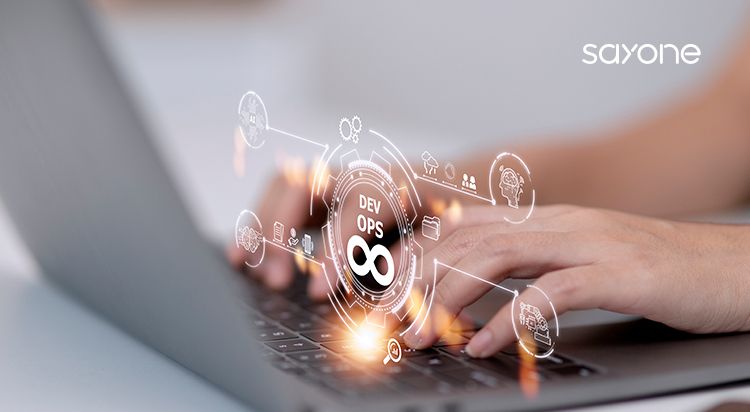
Subscribe to our Blog
We're committed to your privacy. SayOne uses the information you provide to us to contact you about our relevant content, products, and services. check out our privacy policy.

Ranju R November 25, 202411 min read

Generating table of contents...
DevOps and MLOps are two important operational frameworks that have emerged to improve software development and machine learning processes. DevOps, an established practice, aims to connect software development and IT operations.
Its wide adoption is clear, with 80% of organizations globally using DevOps practices. DevOps has improved efficiency, with 61% of companies reporting better quality of deliverables after implementation.
MLOps, a newer concept, tackles the specific challenges of deploying and maintaining machine learning models in production.
Both frameworks face issues like cultural changes, tool adoption, and integration difficulties. However, they also provide benefits. The DevOps market is expected to reach $25.5 billion by 2028, and the MLOps market is expectected to reach $5.9 billion by 2027.
The rise of DevSecOps is evident, with 36% of surveyed respondents now including security considerations from the start in their software development processes. This approach ensures that both DevOps and MLOps continue to drive innovation and operational excellence in the changing technology field.
DevOps is a collaborative approach that merges software development and IT operations focusing on automation, continuous integration, and quick software delivery. It breaks down team barriers, improves workflows, and speeds up development.
DevOps uses tools and practices that allow for frequent, small updates, making software creation more efficient and reliable.
DevOps is based on several guiding principles that help streamline the software development process.
Key principles include:
MLOps, or Machine Learning Operations, is a fusion of machine learning and DevOps practices, streamlining the ML lifecycle from development to deployment.
It emphasizes automation, collaboration, and continuous improvement. By integrating data science, engineering, and operations, MLOps enhances model reliability, accelerates time-to-market, and ensures consistent performance in production environments.
MLOps improves machine learning workflows, fostering better efficiency and collaboration across teams. Automating model deployment, improving monitoring, and ensuring reproducibility helps reduce time-to-market and maintain model quality.
The main benefits of MLOps include:

Understanding the distinctions between DevOps and MLOps is important for businesses aiming to implement machine learning effectively. While both methods seek to improve efficiency and collaboration, they differ notably in their focus and implementation.
Let's explore the main differences between DevOps and MLOps to help you manage the complexities of implementing ML in your organization.
As an entrepreneur, you've likely faced challenges with data management in traditional software development.
MLOps needs comprehensive data management and versioning systems to track not only code changes but also changes in datasets and model versions. This is necessary for reproducibility and auditing of ML models.
Unlike traditional DevOps, where version control mainly focuses on code, MLOps must account for the changing nature of data. This includes tracking data lineage, managing different versions of datasets, and maintaining a clear history of model training runs.
How can data versioning improve the reliability and reproducibility of your ML models?
In traditional DevOps, the focus is on code development and deployment. MLOps, however, introduces a new layer of complexity with model training and experimentation.
As a business owner, you'll need to account for the iterative nature of ML model development, which often involves numerous experiments with different algorithms and hyperparameters.
This process requires specialized tools and infrastructure to manage experiments, track results, and compare model performance across different iterations.
ML models can degrade over time due to changes in data distributions or user behavior. This phenomenon, known as model drift, poses a unique challenge for MLOps.
To address model drift effectively, consider implementing:
These systems allow you to proactively identify when model performance begins to degrade and take corrective action before it impacts your business outcomes.
DevOps focuses on continuous monitoring of application performance, system health, and user experience. While the software itself doesn't "degrade" in the same way ML models do, DevOps practices still emphasize ongoing monitoring and improvement.
Key aspects of DevOps monitoring include:
DevOps teams use these monitoring practices to identify issues, optimize performance, and guide future development efforts
MLOps often require specialized infrastructure to handle the computational demands of training and deploying ML models. As an entrepreneur, you'll need to consider the unique resource requirements of ML workloads, which can be different from traditional software applications.
Cloud providers like AWS, Google Cloud, and Azure now offer specialized ML infrastructure services, including GPU-enabled instances and managed ML platforms. Understanding cloud GPU pricing is crucial when selecting the right provider to ensure you balance cost-efficiency with performance needs.
These services can help you optimize your infrastructure for ML workloads, balancing cost-effectiveness with performance requirements. Also, consider implementing container orchestration tools like Kubernetes to manage and scale your ML workloads.
DevOps Infrastructure
DevOps infrastructure focuses on traditional application deployment and scaling needs, primarily utilizing Infrastructure as Code (IaC), build servers, and CI/CD automation tools.
The infrastructure requirements are typically more predictable and standardized compared to MLOps, centering around:
In DevOps, collaboration typically occurs between Devops Engineers, software developers and IT operations teams. MLOps, however, introduces data scientists and ML engineers into the mix.
As a business owner, you'll need to foster collaboration between these diverse teams and ensure they have the tools and processes to work together effectively.
To promote collaboration initiatives, focus on:
To ensure your ML models are compliant and ethical, implement governance frameworks, including:
DevOps approaches compliance and ethics from a traditional software engineering perspective, focusing on system security and operational integrity.
Teams implement security compliance scanning within CI/CD pipelines to catch vulnerabilities early in development. Access control and authentication mechanisms protect system resources, while infrastructure security is managed through compliance-as-code practices.

Selecting between MLOps and DevOps is an important decision that can notably affect your organization's efficiency and success in developing and deploying software or machine learning models.
Are you unsure whether your project primarily involves traditional software development or machine learning models?
If your project mainly focuses on developing and deploying software applications without a major machine learning component, Choosing DevOps for your project management might be the more appropriate choice. It offers an efficient approach to software development, emphasizing collaboration between development and operations teams.
Conversely, if your project heavily depends on machine learning models, MLOps could be the better option.
MLOps extends DevOps principles to address the specific challenges of machine learning workflows, including data management, model versioning, and ongoing model monitoring.
As an entrepreneur, you're likely interested in maximizing your team's potential and resources. DevOps requires knowledge in software development, testing, and IT operations.
If your team is already skilled in these areas, implementing DevOps practices could be a natural next step.
MLOps, however, requires additional skills in data science, machine learning, and specialized tools for model development and deployment. Consider whether your team has the necessary expertise or if you're willing to invest in training or hiring specialists.
When thinking about long-term growth, which approach offers better scalability for your business?
DevOps provides a solid foundation for scaling traditional software applications, with established practices for managing infrastructure and deployments at scale.
It's particularly effective for businesses focusing on web applications, mobile apps, or enterprise software.
MLOps, while newer, offers specialized tools and practices for scaling machine learning operations. If you expect your business will increasingly rely on ML models, investing in MLOps could provide a more future-oriented solution.
It addresses issues like model drift, data versioning, and reproducibility that become important as ML operations grow.
DevOps excels in speeding up software delivery cycles, which can be important for businesses needing to quickly respond to market demands or competitor actions.
MLOps, while potentially slower in initial deployment, offers a more comprehensive framework for ensuring model accuracy and reliability over time. It includes practices for continuous model monitoring and retraining, which are essential for maintaining the performance of ML models in production.
Key Considerations for Time-to-Market vs. Accuracy:
DevOps practices can be adapted to meet various compliance standards, with established methodologies for security, auditing, and traceability in software development.
MLOps goes further by addressing specific challenges related to ML model governance. It provides frameworks for model explainability, bias detection, and version control of both data and models.
This can be necessary for businesses in highly regulated industries like finance or healthcare, where the decision-making process of ML models needs to be transparent and auditable.
As a business owner, you need to consider the cost implications and potential return on investment (ROI) for each approach.
DevOps often provides more immediate cost savings through increased efficiency in software development and deployment processes. It can lead to faster time-to-market and reduced operational costs.
MLOps, while potentially more expensive to implement initially due to specialized tools and expertise required, can offer substantial ROI for businesses relying heavily on ML models.
By improving model accuracy, reducing model drift, and automating ML workflows, MLOps can lead to better business outcomes and reduced long-term costs associated with maintaining ML systems.
DevOps provides a solid foundation for traditional software development and can be adapted to include some ML workflows.
However, if you anticipate a major shift towards AI and ML in your business, investing in MLOps now could position you better for future technological advancements.
MLOps is designed to handle the complexities of ML workflows and can scale as your ML initiatives grow.
It provides a framework for managing the entire ML lifecycle, from data preparation to model deployment and monitoring, which can be important as AI and ML become increasingly central to business operations.
SayOne is your trusted partner in implementing cutting-edge MLOps and DevOps practices.
Our team excels in blending MLOps and DevOps practices to create a unified, efficient development ecosystem.
We specialize in customizing solutions that streamline your ML model lifecycle and software delivery pipeline. Let us help you unlock the full potential of your development teams. Contact us Today!

We're committed to your privacy. SayOne uses the information you provide to us to contact you about our relevant content, products, and services. check out our privacy policy.

About Author
Helping businesses scale-up their development teams ( Python, JavaScript, DevOps & Microservices)

We collaborate with visionary leaders on projects that focus on quality